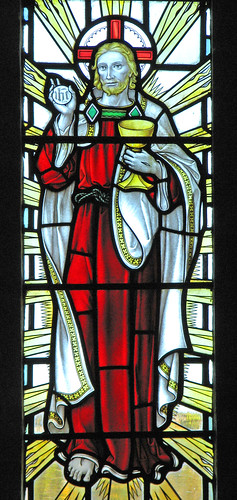One of the things we do in the course of our priestly formation is to learn to preach. The preaching class gives the young friar a chance to prepare a homily, and then deliver it in church to his classmates and an experienced friar preacher. They then discuss the sermon and give feedback to the student. Below is a sermon prepared for one of these classes, for today, the Sixth Sunday of Easter.
Readings: Acts 15:1-2. 22-29; Psalm 66; Apoc 21:10-14. 22-23; John 14:23-29.
Light is just one of those things that we take for granted. When it’s there we bask in it without a second thought, going about our tasks. But as soon as it’s gone and we’re left in darkness, we’re paralyzed, unable to do anything. Peace is rather like that too: we only notice when it’s gone … and like the English summer sun, there’s a certain fragility and unpredictability to it … It can be gone in a moment.
When peace is lost, we long for it, just as we long for light, or health, or love when it is absent. We feel its absence more than its presence because peace is undoubtedly good, it simply ought to be there. But in a world broken by sin, things that ought to be there sometimes aren’t. And so, we experience darkness, and suffering, and hatred.
Jesus’ death on the Cross, when he endured all these things, is God’s response to a broken world. In the absence of good, Jesus not only desired good like we do, but because He is good, He restored all that is good through his Resurrection.
But this is hard to believe! After all, aren’t we still sinners? Aren’t people still suffering and dying? And isn’t a sunny Bank Holiday still as elusive as ever? Things that simply ought not to be in a perfect world are still around. But then … no one ever said this world was perfect. Only in the heavenly Jerusalem, will there be no more sin, no more pain, no more sorrow or death, and no rained-out barbecues but unending light! Until we get there, we will still experience absences of good, such as fear and sin.
Indeed, it is fear that keeps us paralyzed in the darkness, and sin that blinds us from seeing the light of the risen Lord. But into this situation, Christ comes and says: “Peace be with you”. Just as in creating the world, God spoke his Word and there was light … so in creating the new world, a world that is coming into being because of Easter … God spoke his Word, “Peace be with you”, and there was peace. The peace the risen Christ gives is a “peace that the world cannot give”. It is the peace that comes from the world of the Resurrection, that world in which all good is restored. This peace, which the risen Lord speaks into being, is stronger than our petty quarrels, stronger than sin, stronger than death itself … for it is a peace that is born of love, the love of the Cross.

But sometimes, faith and hope, which ought to be there, simply isn’t. And so, we feel anxious and fearful. We have no peace. And so Jesus, knowing how hard it can be for us because he shares our humanity, left us His peace.
God also sends his Holy Spirit to remind us of Christ’s words. So, at every Mass, when we are gathered in the Spirit, we are reminded of His promise: “I leave you peace, my peace I give you”. We hear these familiar words every day and it’s a shame if we let them become so familiar that we take them for granted. Moments after these words are said, we ask the Lord to “grant us peace”. And He answers our request by giving us His Body and Blood. For the Eucharist is the great sign of the peace that He left us. The Eucharist is given to us to eat and to drink so that God can come and make His home with us. So, when we receive the Lamb of God, we become the holy city in which God dwells. And He lives in us as our light. And this light of the Eucharist scatters the darkness of sin, fear, and hatred. And we are filled with grace, hope, and love. This state of affairs, in which we are reconciled to God and one another, is rightly called peace, because it is good. This communion with God and neighbour simply ought to be. So … when it is absent because of sin or fear, our souls long for its restoration.
We need light to carry on with our daily tasks. So, too we need the peace that Christ gives us in this Sacrament. It is our food for the journey, that keeps us going on life’s pilgrimage, towards that final home with God, where the promise of this Sacrament becomes an eternal reality. We may take some things for granted, but let us not take this gift of peace for granted. For this sacrament, and this liturgy, is our eucharistia, our thanksgiving.
This deeply blessed me today. Thank you for sharing! And may God continue to bless your formation. Clearly, you are heading in the right direction. :)
ReplyDeleteA very fine sermon!
ReplyDelete